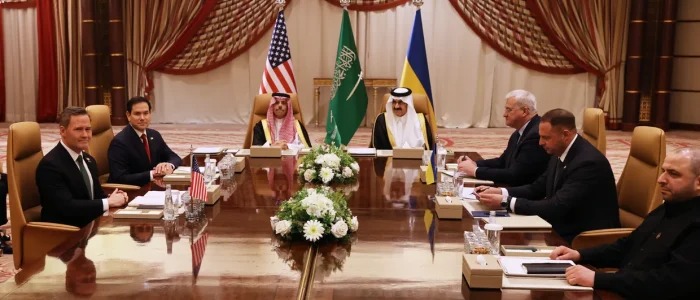In a sudden turn of events, the long-anticipated talks between Russia and Ukraine have begun after three years of prolonged crisis. The talks are held in Riyadh, Saudi Arabia with US President Donald Trump overseeing the progress. While this move may pave the way for ending the conflict, leading to greater stability in the region, it offers lessons for European allies particularly NATO members. Although this is an evolving situation and both sides have reached a temporary ceasefire in the Black Sea, the final outcome of the negotiations will dictate the future of Ukraine, redefine Europe’s security architecture and NATO’s role in it. Since decades, European security has been dependent on NATO primarily because US is the leading actor in the alliance. However, the limited ceasefire and the terms agreed upon (details are not released yet), indicates that Ukraine has been pushed to make significant compromises which may erode NATO’s unity and raise concerns about the future of US security guarantees. It is imperative to mention that European states including Baltic states, Poland, Germany, Sweden, France and Finland are on Ukraine’s side, actively supporting Ukraine’s stance through humanitarian assistance, military aid and diplomatic backing.
In addition, the US is pushing Ukraine to sign a mineral deal that includes resource extraction of critical minerals such as titanium, lithium and rare earth minerals. Ukraine’s leadership is wary of the fact that this deal would compromise Ukraine’s immediate needs and serve only American interests – to reduce dependence on China by securing access to rare minerals through Ukraine. These minerals are essential for global supply chains particularly in the defense and technology sectors. This US push for mineral deal raises concerns for its European allies particularly NATO countries as pushing for such a deal during war, sets dangerous precedent where military assistance during wartime is tied to future economic concessions. In another perspective, European allies might see it as US taking leverage of Ukraine’s vulnerability. The perception that western aid is contingent upon access to Ukraine’s natural wealth, significantly undermines the spirit of genuine partnership among NATO members, complicate post-war reconstruction and Ukraine’s economic sovereignty. It may also deepen suspicions on neocolonialism. Furthermore, European allies within NATO may view this as a unilateral effort to achieve economic interests under the guise of alliance solidarity. NATO’s unity is already fractured therefore, this move could exacerbate the tensions within NATO and increase the divergence of interests.
Furthermore, Ukraine’s President Zelensky said that the issue of Ukraine’s nuclear power plants was not addressed in the talks. If the talks proceed without concrete mechanisms to secure nuclear facilities and demilitarization of disputed territories, Europe’s trust in US policies will be diminished. However, the notable positive aspect of the talks is that it demonstrates US’ willingness to engage in proactive crisis management between Russia and Ukraine. While the potential concessions on Ukraine’s part may concern European allies, US decision to come on the table with Russia to explore diplomatic options will most likely result in the successful management of the prolonged conflict.
Nevertheless, US direct talks with Russia reflects a calibrated shift in US foreign policy and implies that economic gains are at the core of US national interests. The US avoided any direct negotiations with Russia over Ukraine for two years. Moreover, the US heavily supported Ukraine in terms of military and economic aid besides putting coordinated pressure through NATO and the European Union (EU). Now this shift in its policy and mounting pressure to contain the war indicates that Washington’s focus is shifted toward other geopolitical priorities particularly the Indo-Pacific and its competition with China. Europe is no longer on Washington’s priority list and the realization that protracted conflict has drained enough resources may have compelled US to push Ukraine to come on the negotiating table in order to end the conflict even if it means losing the war for Ukraine. The negotiation process is ongoing and no matter what the final outcome will be, the lessons they served for the European allies are ominous. It signals that US interests are purely transactional, long-term commitments can be revoked if they are not serving American interests, and US security guarantees are not reliable. Therefore, European allies are responsible for their security and this realization may translate into shifting military postures, increased defense spendings or even the adoption of a regional security framework.
This article was published in another form at https://cscr.pk/explore/themes/politics-governance/lessons-for-europe-from-the-russia-ukraine-peace-talks/
Maryyum Masood is working as a Research Officer & Associate Editor at the Center for International Strategic Studies (CISS) Islamabad. She is an MPhil scholar in the Department of Strategic Studies at the National Defense University (NDU) Islamabad.

